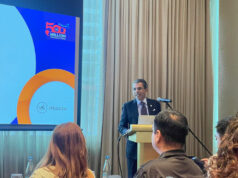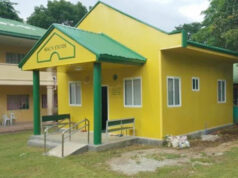BMW AG is exploring buying more auto parts from the Philippines and is preparing to help the local electric-vehicle (e-vehicle) industry set up the needed infrastructure for e-vehicles, including charging stations, Trade Secretary Ramon M. Lopez said.
Mr. Lopez made the announcement in a chat message to reporters following meetings at a conference in Nuremberg, Germany where he explained the government’s economic policies.
“In all the talks, meetings and fora with several German business chambers and companies this week in Germany, we had the chance to explain Dutertenomics and the inclusive growth agenda of the Duterte administration,” Mr. Lopez said.
He said the BMW group will be sourcing more electrical parts from the Philippines as part of its strategy in the Association of Southeast Asian Nations (ASEAN).
He said BMW imports €16 million worth of auto parts, specifically components and electric control units, from the Philippines annually “and intends to increase that value in the coming years.” He did not disclose a figure for the target growth.
Based on BMW’s ASEAN strategy, Thailand and Malaysia are its designated manufacturing hubs in the region while the Philippines is a key parts supplier, Mr. Lopez said.
“BMW also intends to bring latest plug-in hybrid vehicles and collaborate with the E-Vehicle Association of the Philippines in building the necessary e-vehicle infrastructures such as the setting up of charging stations in the country,” he added.
He added that he had the opportunity to talk more of “the various trade and investment opportunities in the country, the inclusive and innovation-led industrialization strategies, including the tax reform and the aggressive infrastructure program,” he said on Monday.
Meanwhile, Knauf Gips also met the secretary at the Asia Pacific Forum, which gathered in Nuremberg around 400 participants from German business chambers and companies that trade with and invest in the region.
“Excellent meeting here with the CEO of German company Knauf, a leading manufacturer of gypsum-based plasterboard worldwide,” he said.
Mr. Lopez said Knauf is investing $50 million to set up a new plant in Batangas, a move that will serve as “the beginning of its local production of plasterboards for domestic and export markets.”
“They recognize the fast-growing Philippine market, the stability of the business environment in the Duterte administration and the quality output of Filipino workers,” he said.
He said the investment is expected to create 100 direct jobs at the start, which could grow over time. He said the starting production capacity would be 16 million square meters “and they have provided space for future expansion.”
Mr. Lopez said the Department of Trade and Industry and its investment promotion arm, the Board of Investments, are “committed to provide assistance in documentary requirements and accredited contractors as they aim to commence commercial production toward early 2018.”
Mr. Lopez said during the meetings and conferences he attended, he gave his assurance to German entities “of the effective anti-crime and illegal drug campaign that improved the peace and order situation in the country and generated higher approval ratings for the President.”
He said a “usual topic” raised during most meetings was the importance of strengthening the country’s economic relations with Germany, which is the Philippines’ sixth largest export market.
Germany is also the country’s seventh-largest source of investments. The Philippines enjoys a surplus with the trading partner, a member of the European Union, with which the country is negotiating a free trade agreement (FTA).
Mr. Lopez said the importance of the FTA negotiations and the generalized system of preferences plus (GSP+) were also discussed. GSP+, a preferential tariff scheme, allows the Philippines to export more than 6,200 products to the bloc’s member countries tariff-free. — Victor V. Saulon



